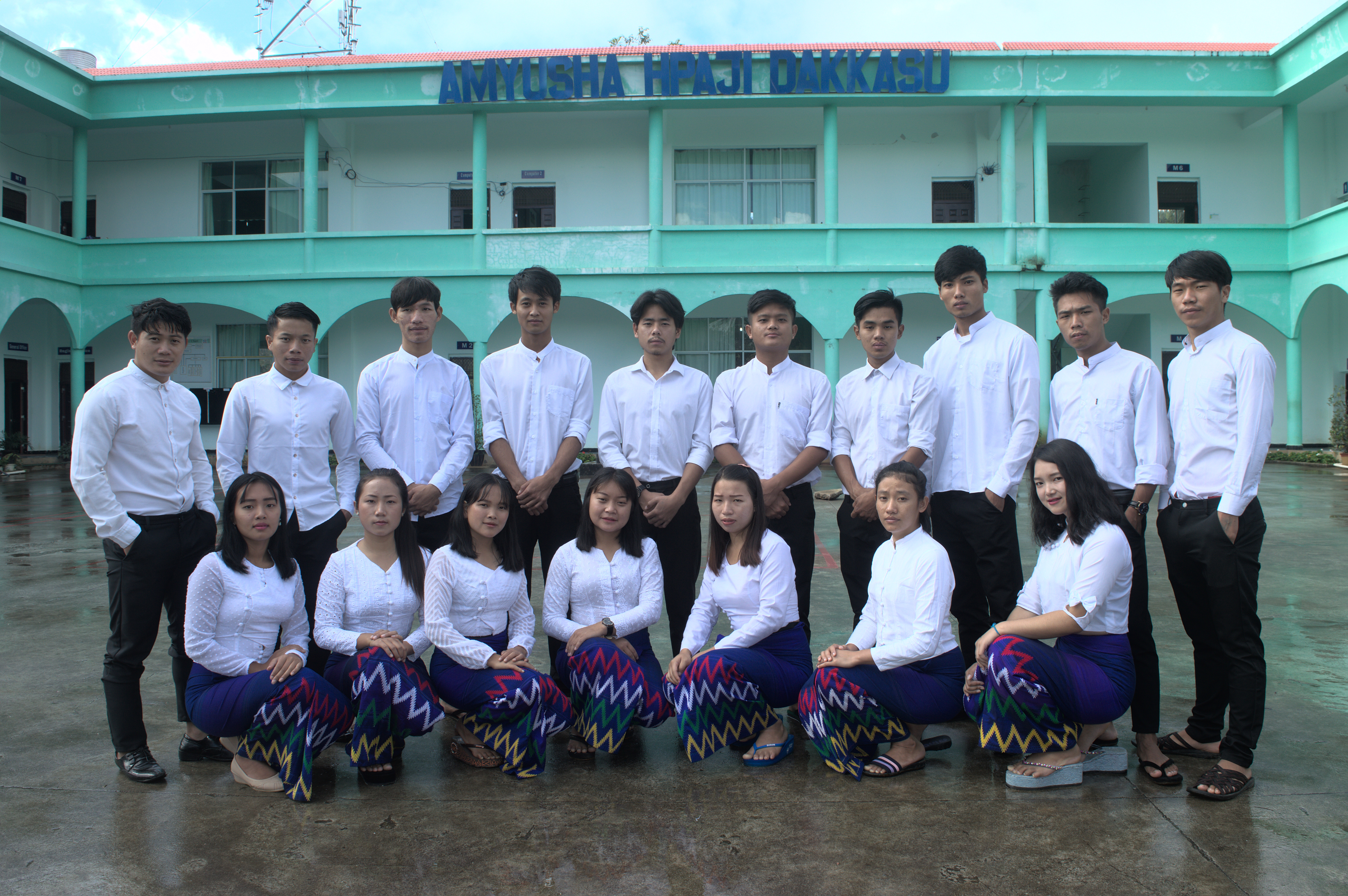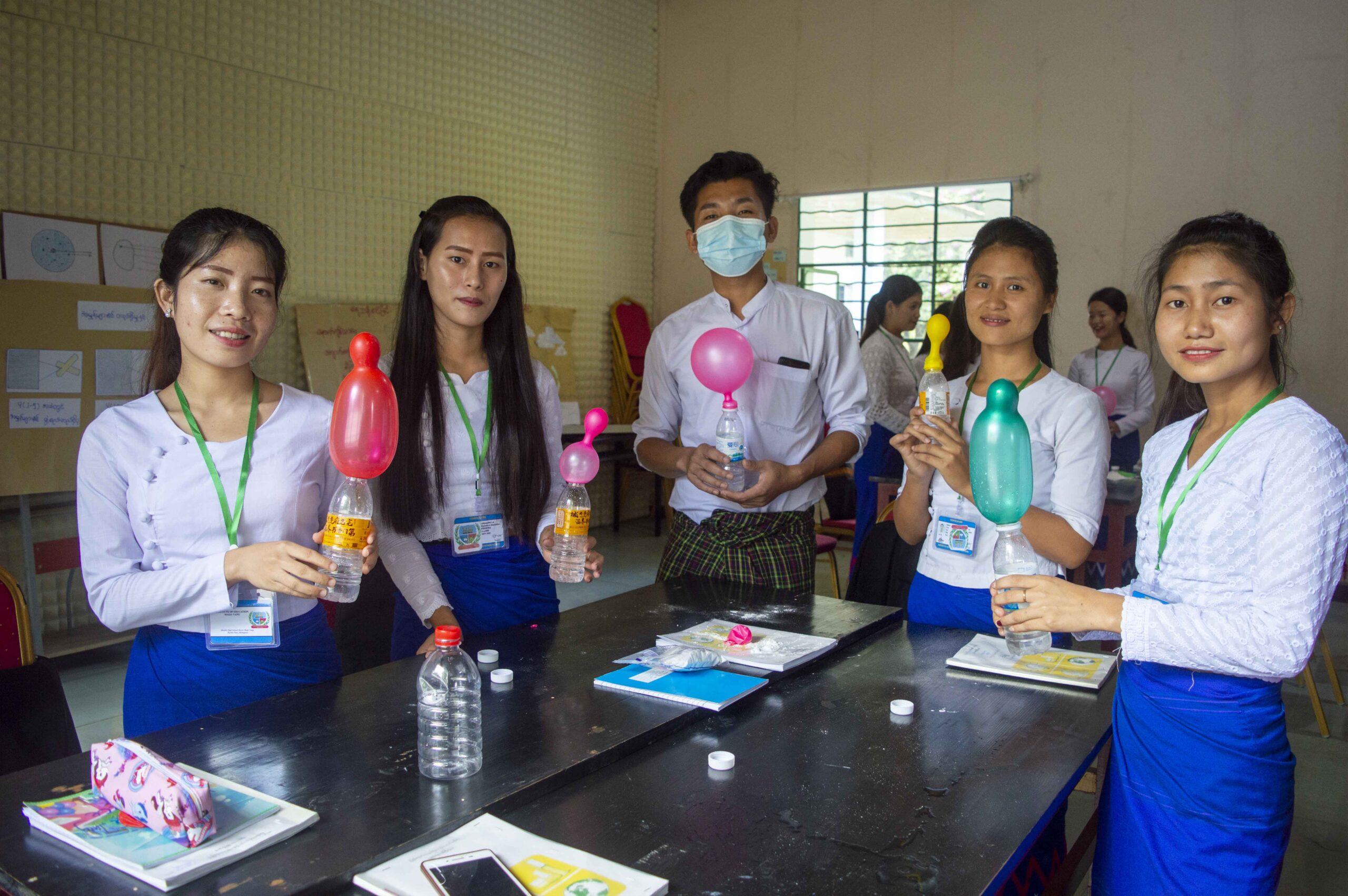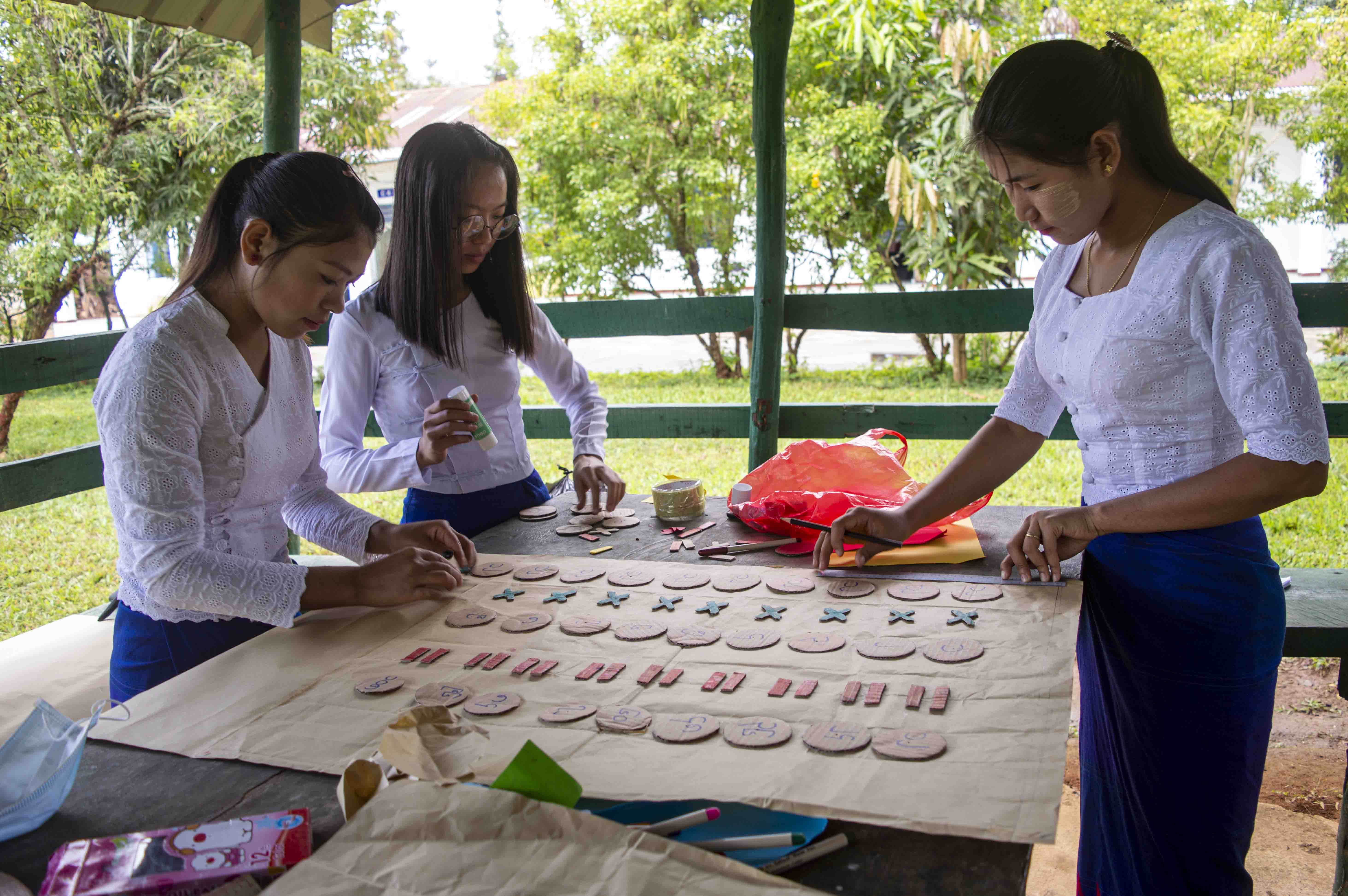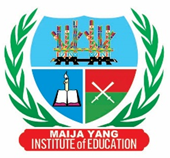HISTORY OF INSTITUTE OF EDUCATION
Mai Ja Yang
Vision for Mai Ja Yang Institute of Education
MIEd gaw Wunpawng Amyusha ni a matu hpaji lam hte seng nna myit mada shara rai nga ai. Ndai Institute gaw tsaban 21st kaw jailang mai ai, mungkan madang dep ai hpaji ni hpe jaw lu na matu re. Jaw mayu ai hpaji ni hpe sharin ya lu na matu hte sharin ya ai madang ni hpe shatsaw sa wa lu na matu mung kaga wuhpng ni the jawm galaw ai hpe madung tawn nna, myit chye myit chyang hpaji ni hpe prat madang dep sawk sagawn ai ladat the ningnan shalat ai ladat ni hpe n-gun dat sa wa na re.
MIEd kaw nna jawng ngut sai jawngma ni a ntsa myit mada ai lam ni
- Myit hte hkumhkrang hkamja, myit jasat jasa kaja ngangkang nna tinang hkum tinang kam lu ai hte myit ningchyan shaw lu ai ni.
- Bungli hta kungkyang nna shinggyi wuhpung rawt jat wa lu na matu hpaji lam tha lit la woi awn mayu, woi awn lu ai ni.
- Kaga mungdan kaw na masha ni hte matut mahkai nna bungli rau galaw chye ai masha ni hpe sharin shalat ya lu ai ni.
Mission for Mai Ja Yang Institute of Education
Amyusha Hpaji Institute gaw jawngma ni hpe myitmang ai madang tsaw wa hkra, myit sawn sumru ai atsam kaja hkra, lawnglam jawjaw myitmang mahtai chye tam wa hkra, ta tut bungli ni hpe woi awn galaw lu ai hpu-awn kaja byin tai wa hkra, prat madang hta hkan nna myitmang chye, galaw chye ai ni tai hkra hte shinggyim wuhpung wuhpawng hpe akyu jaw garum lu ai ni byin hkra prat madang dep ai hpaji ninghkring ni hte jawm sharin shalat sa wa na re.

Amyusha Hpaji Institute a Labau Kadun
Wunpawng Mungdan Shanglawt Asuya, Ginjaw Hpaji Dap gaw 1997 hta Mai Ja Yang kaw Sara Hpaji Sharin Jawng hpaw hpang nna dai jawng hpe 2009 ning hta Sara Hpaji Hkawlik Madang sharawt nhtawm, 2014 ning, September shata hta Institute of Education (Amyusha Hpaji Institute) madang de bai sharawt hpaw dat ai. Amyusha Hpaji Institute a labau hpe gadun ai hku nna ninggam masum mu mada lu ai.
- Sara Hpaji Sharin Jawng (TTS)
- Sara Hpaji Hkawlik (TTC)
- Amyusha Hpaji Institute (MIEd)
1. Sara Hpaji Sharin Jawng (TTS)
1997 ning June Shata 11 ya shani, Mai Ja Yang Muklum hta KIO hpaji dap kaw nna woi awn ai hte hpaw hpang dat sai. Jawng hpaw ai a yaw shada lam ni gaw, KIO a hpaji madang hpe shatsaw sa wa lu na matu, Kungkyang ai lawu tsang madun sara ni hpe shalat sa wa na matu, jawng sara ni mahkra jawng sara hpaji hpe sharin hkaja la lu na matu hte madang hkrak ai hpaji hpe sharin la lu na matu madung yaw shada let hpaw hpang dat ai.
Sara Hpaji Jawng hpaw hpang ai kaw nna 2008 du hkra rai yang jawngma (664) hpe sharin shalat dat lu ai. Dai ten na jawng-up ni gaw, Kumhtat Hting Nan (1997-2004) hte Lahpai Hkun Seng (2004-2008) rai nga ai.
Sara Hpaji Jawng hta madung sharin ya ai lam ni gaw, lawu tsang sharin ginhpan (subject matter) ni hte sharin ladat ni, Basic computer, Child Development, Lata Hpaji, Sanseng Hkamja Lam, Child Centered Approach, English Grammar, Hkrangpan Hpaji, Ninggawn Mungmasa ni hte kaga ginsup ladat ni rai nga ai.
2. Sara Hpaji Hkawlik (TTC)
2009-2010 Hpaji Ladaw kaw nna Sara Hpaji Sharin Jawng hpe Sara Hpaji Hkawlik de madang shatsaw dat sai. Madang shatsaw dat ai a yaw shada lam ni gaw, kung kyang ai lapran tsang madun sara shalat shapraw sa wa lu na matu, jawng sara hpaji hpe grau tangdu ai hku sharin hkaja la lu na matu, Wunpawng Amyusha ni a Hpaji madang hpe shatsaw sa wa lu na matu hte madang hkrak re ai hpaji hpe sharin ya lu na matu rai nga ai.
Jawng up magam lit hpe Lahpai Hkun Seng (2009-2011) hte Nnye La Raw (2011-2013) yan gun hpai wa sai. Sara Hpaji Hkawlik kaw nna awng pru wa sai jawngma yawng gaw 387 rai nga ai.
Sara Hpaji Hkawlik hta sharin ya ai ginhpan ni gaw, Langai ning (first year) kaw lawu tsang na ginhpan ni hpe sharin ai ladat, Lahkawng ning (second year) kaw lapran tsang na ginhpan ni hpe sharin ai ladat ni hte Lak san English sharin ladat, Ma Myit Jasat Hpaji (Child Psychology), Shingyim Lailen (Civic), Hkrangpan, Ningpawt Ninghpang Computer, Ninggawn Mungmasa, CCA (Children Centered Approach), Ta tut sharin shaman ai lam ni hte ginsup ladat hpaji ni sharin ya ai.

3. Amyusha Hpaji Institute (Institute of Education)
Wunpawng Mungdan Shanglawt Asuya, Ginjaw Hpaji Dap kaw nna 2014 September shata hta Amyusha Hpaji Institute ngu nna madang shatsaw dat ai re. Hkawlik kaw na Institute de madang shatsaw dat ai a yaw shadaw lam ni gaw, (1) Wunpawng Mungdan shanglawt lu wa hkra woi jasat jasa ai ningbaw ningla ni byin tai wa hkra sharin achyin lam madun ya lu ai, atsam ningja hte hpringtsup ai sara kaja ni shalat na matu, (2) Wunpawng Mungdan hte Amyusha hpe hpaji masa hta mungkan hte shingdaw nna woi awn lu ai hte makawp maga chye ai, tsawra shawang myit dam lada ai hpu-awn kaja ni hpe sharin shalat ya lu na matu, (3) Wunpawng amyu marai hkum shagu dinghkrai shanglawt lu ai ni byin tai wa lu na matu, ni re.
Amyusha Hpaji Institute hta Jawng-up lit hpe gunhpai lai sai gaw Lahpai Hkun Seng (2014 – 2017) hte Lasang Htu Hkawng (2017-2018) yan rai nga ai. 2018 kaw nna ya du hkra gunhpai nga ai jawng up gaw Nnye La Raw rai nga ai. Amyusha Hpaji Institute kaw nna 2020 du hkra marai (1145) hpe sharin shalat dat sai.

Mai Ja Yang Institute of Education (IEd) A Myit Mang Ai Lam (Philosophy)
- Masha gaw tinang a gam maka hpe tinang nan hparan na ahkaw ahkang lu ra ai.
- Arawn alai hte galaw mawmawn ai lam gaw dai masha a manu re hpe kam ai.
- Galaw ai magam, bungli shagu gaw mai kaja akyu rawng ai lam byin rai ra ai.
- Shinggyim masha marai hkum shagu hpe rap ra ai tara hte makawp maga da nna, ahkaw ahkang mung maren sha lu ra ai.

MIEd a ahkyak dik ai myitmang lam (Philosophical Cornerstones)
- Hpaji lam hta greng grak ai (academic excellence)
- Shinggyim masa a lit (social responsibility)
- Wanglu wanglang, myitmang, tsun shaga lu ai (freedom of expression and thinking)
- Myit masa ngang kang hpraw san ai (integrity)
- Lawng lam jaw kaja ai hku chye myit mang ai (rationality)
Vision of Mai Ja Yang Institute of Education
To be a leading educational institution in the Kachin community and to achieve the highest level of intellectual excellence within a diverse and collaborative society.
The goals of MIEd for its Graduates
- To form independent, trustworthy and reliable educators.
- To support the development of skills and capacity for prospective leaders.
- To enable educators to connect and collaborate at international level with educational institutions and other entities.
Mission of Mai Ja Yang Institute of Education
Mai Ja Yang Institute of Education exists for the primary purpose of serving the nation through the generations, contributing to the dissemination and application of education, in scientific, technological and humanistic knowledge, through research, collaborations and partnerships, steadily built and based in interdisciplinary scholarship.

The History of Mai Ja Yang Institute of Education
Teacher Training School (TTS) was established by the Education Department of the Kachin Independence Organization in Mai Ja Yang, Kachin State, Myanmar, in 1997. Then, in 2009, it was renamed Teacher Training College (TTC). TTC was upgraded to Mai Ja Yang Institute of Education in September 2014. Thus we can summarize the history of the Institute of Educaton in the following steps:
- 1997, Teacher Training School (TTS)
- 2009, Teacher Training College (TTC)
- 2014, Mai Ja Yang Institute of Education (MIEd)
1. Teacher Training School (TTS)
In June 1997, the Education Department of the Kachin Independence Organization (KIO) started to establish a teacher training centre, Teacher Training School (TTS), in Mai Ja Yang, Kachin State, Myanmar. The goal of the establishment of TTS was to develop the educational system in the KIO area, and to advance the capacity and skills of primary school teachers.
From 1997 to 2008, 664 students got their graduation at TTS. The principals were Mr. Kumhtat Hting Nan (1997-2004), and Dr. Lahpai Hkun Seng (2004-2008).
TTS offered courses on primary level subjects and teaching methodologies. Furthermore, at the school other essential subjects were taught, such as basic computer skills, child development, handicrafts, sanitation and health, Child Centered Approach, English grammar, drawing, political science, and sports.
2. Teacher Training College (TTC)
In the 2009-2010 academic year, Teacher Training School was upgraded to Teacher Training College in order to form and develop the capacity of middle level school teachers.
The principals of TTC were Dr. Lahpai Hkun Seng from 2009 to 2011 and Mr. Nnye La Raw from 2011 to 2013. At TTC the first year courses focused on primary school while middle school subjects and teaching methodologies were taught in the second year. In addition the program of studies was completed by child psychology, civics, drawing, basic computer skills, politics, child centered approach, and sports courses. Both first and second year student-teachers participated in a practicum. TTC also had a Special English Class which was mainly focused on English teaching methodologies, four skills, and grammar.

3. Mai Ja Yang Institute of Education (MIEd)
The Education Department of KIO upgraded Teacher Training College to Institute of Education in September 2014. The objectives of MIEd are: (1) to form capable and competent teachers able to contribute to the progress of Kachin People’s independence movement, (2) to upgrade Kachin educational system to meet current educational standards, and (3) to form independent individuals.
The principals of MIEd were Dr. Lahpai Hkun Seng (2014-2017) and Mrs. Lasang Htu Hkawng (2017-2018). The current principal is Mr. Nnye La Raw. Between 2014 and 2020, 1145 teachers got their graduation at MIEd.

The Philosophy of Mai Ja Yang Institute of Education
In loyalty to its national mission, Mai Ja Yang Institute of Education stands for:
- the advancement of national awareness among Kachin youth;
- the promotion of self-development through the teaching profession;
- the commitment to be a light that leads people towards the true source of all knowledge and life, and
- the furtherance of justice, equal rights and opportunities for all.

The Philosophical cornerstones of Mai Ja Yang Institute of Education
- Academic excellence in education,
- Social responsibility
- Freedom of expression
- Integrity
- Rationality
